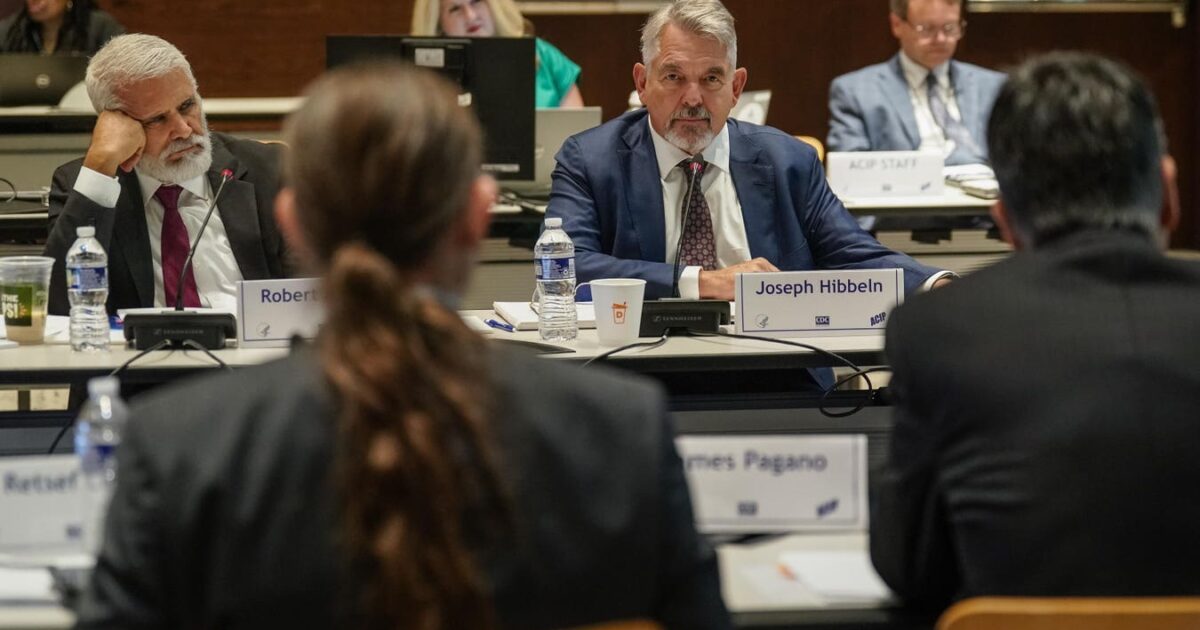The ACIP Is Set To Meet This Week. Here’s What’s At Stake For Public Health

ATLANTA, GEORGIA – JUNE 25: New committee members Robert Malone and Joseph Hibbeln attend the first meeting of the CDC’s Advisory Committee On Immunization Practices at the CDC global headquarters on June 25, 2025 in Atlanta, Georgia. Robert F. Kennedy Jr., Secretary of Health and Human Services, recently fired and replaced all seven members of the committee. (Photo by Elijah Nouvelage/Getty Images)
Getty Images
The Advisory Committee on Immunization Practices is set to meet September 18-19 to discuss and possibly vote on a number of childhood and adult vaccines. The agenda will include discussions on the COVID-19 vaccines, Hepatitis B vaccine, Measles, Mumps, Rubella, Varicella vaccine and the Respiratory Syncytial Virus vaccine.
The ACIP is an influential expert panel that has historically advised the U.S. Center for Disease Control and Prevention on vaccine policy, such as who should get them and under what circumstances. Their recommendations often determine if insurance companies cover the vaccine free of charge for a patient and if pharmacies readily distribute them.
In June, Secretary of Health and Human Services Robert F. Kennedy Jr. stirred controversy when he fired all 17 sitting members of the group and replaced them with his own appointees, many of whom are skeptical of the safety and efficacy of vaccines. Given all the recent changes to the ACIP, here is what is at stake for public health this week.
COVID-19 Vaccine Accessibility
COVID vaccines have traditionally been available to anyone 6 months of age and older. That changed recently when the FDA restricted eligibility for those 65 years of age and older, or for those younger with an underlying condition that would put them at high risk for severe COVID infection. Although pregnancy has traditionally been considered a risk for COVID infection, Kennedy has since stated that healthy pregnant females would not qualify to get the shot.
The ACIP meeting will be critical in providing guidance on who will definitely be eligible to get the vaccine, and exactly what underlying conditions qualify an individual to be at high risk for severe COVID infection. Broader eligibility would mean the shot would be covered by most insurance companies, and that most pharmacies would carry the vaccine for distribution. If eligibility is narrowed, vulnerable patients such as pregnant females and children under the age of 2 could face challenges in receiving the vaccine. The end result could make it much more difficult for these vulnerable patients to get access to the vaccine, which could potentially result in increase cases and hospitalizations for COVID-19 during the peak fall season when the virus usually surges.
Hepatitis B Vaccine Considerations
The ACIP will also address the Hepatitis B vaccine, including a possible reconsideration of the recommendation to give all newborns a dose within the first 24 hours of life. Currently, most individuals receive three doses of the Hepatitis B vaccine within the first year or two of life. This has been a lifesaving public health intervention, with the shots estimated to prevent 38 million deaths among people born between 2000-2030 in 98 low- and middle-income countries, according to the CDC.
Critics of the vaccine note that the risk of Hepatitis B to a newborn is minimal if the mother tests negative for the virus. Hepatitis B is spread through contact of bodily fluids, and is usually spread either from mother to child during birth, through sexual intercourse, or the sharing of needles and IVs. Many public health advocates would argue that vaccination is critical in preventing the spread of a virus that is the number one cause of liver cancer globally.
If the ACIP rolls back universal recommendations to vaccinate newborns against Hepatitis B, the risk of perinatal transmission of the virus could increase significantly, leading to worsening health outcomes among our most vulnerable population- children. Hepatitis B can lead to liver scarring, liver failure, cancer and ultimately death. If not vaccinated, 9 out of 10 infants infected with Hepatitis B at birth will develop chronic Hepatitis B infection, according to the CDC.
MMRV Vaccine And Vaccine Hesitancy
The ACIP will also discuss the MMRV vaccine and its safety profile. However, both the MMR and MMRV vaccine have been shown to be safe and effective, and previous ACIP meetings have already deliberated on discussing the safety profile of these vaccines.
Although both the MMR and MMRV vaccines are considered to be safe and effective by the CDC, for children between the ages of 1-2, getting the MMRV vaccine was associated with a very minimal increased risk of febrile seizures when compared to getting the MMR and Varicella vaccine separately. In this age group, for every 2,300 doses given, 1 additional case of febrile seizure would be expected 7-10 days after vaccination when getting the MMRV compared to the MMR and Varicella vaccines administered separately, according to the CDC. The CDC currently recommends getting those vaccines separately for those aged 1-2, but parents can opt to get them together when their child is 4 years of age or older.
If significant changes are made to the vaccine schedule or availability of the MMRV vaccines, this could result in increased vaccine hesitancy and undermine public trust in vaccines, which has already been fragile. As an example, vaccine hesitancy fueled the largest measles outbreak this year in America where Texas saw more than 750 cases, claiming the lives of two children. Kindergarten vaccination rates against measles was 82% at the epicenter of the outbreak, well below the 95% needed to achieve herd immunity and prevent measles from spreading.
The decisions at the ACIP meeting this week will have real consequences for public health. The public will need clear guidance going forward with vaccines, particularly as we approach the fall where respiratory infections such as COVID and RSV tend to surge.

